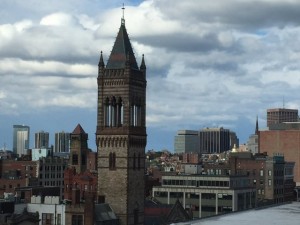American Democracy at the Crossroads
When I was in college many decades ago, I remember being struck by what Alexis de Tocqueville wrote about what had emerged as the United States’ “experiment” in democracy. He saw in the U.S. governmental structure an interpretation of “majority rules” that frightened him. He saw the possibility that an electoral majority might so dominate that it could do whatever it wanted. An electoral majority could then abrogate nearly all rights and needs of everyone else. He foresaw that the “winner take all” aspect of our system could have drastic consequences to those who lost key electoral battles, so that a relatively small electoral majority — a problem amplified yet further by the separation of electors from the popular vote — could so dominate governance that the people as a whole could be largely disenfranchised and a small elite could run roughshod over the needs of the many.
The Constitution attempts to ameliorate this danger with two key elements: The doctrine of the separation of powers, embodied in the three branches of government, and the inclusion of the Bill of Rights. Recent events, beginning with the overall domination of the Republican Party over such a long stretch of time that the Supreme Court is only marginally an “independent” force, gerrymandering has all but guaranteed control of the House of Representatives, and the removal of all fetters on the ability of wealth to determine electoral power, has left vast numbers of people who live in the United States with nearly no control over the governmental decisions that most crucially shape their lives.
Decades of struggle for the rights of women, for racial equality, for worker unification in unions, for humane reactions to those whose political and economic necessities have driven them to immigrate without government approval, for liberalization of draconian drug laws, for quality education regardless of wealth, for health care as a human right — all this and much more has been either driven back or is more threatened today than ever before. Some causes have fared better than others, but overall, we, the people, are less free, less able to control our own destinies, have less confidence that our children will have greater opportunities than we had, and on and on, all because of the ability of a small group to leverage its wealth and power into utterly dominating the masses of people. As bad as this has been for the majority of the American populace, it has been yet more devastating to the most vulnerable members of our society.
Much as people who consider themselves progressives, including me, focus their fear and outrage on Donald Trump. This is, I would say, appropriate, as he is more than merely a symptom of how far our “democracy” has sunk. Each day, he strikes out against all who stand in his way. He goes beyond exploiting a narrow-minded worldview, but actively incites hateful attitudes toward women, towards immigrants, toward environmentalists, towards “liberals,” toward poorer countries of the world as though they were the cause of every person’s miseries.
This is not the democracy “of the people, for the people, and by the people,” but increasingly an oligarchy of extremely wealthy people. Sadly, a very large percentage of the most privileged seem to measure their wealth by increasing the gap of wealth and privilege. Our democracy becomes still more of a “corpocracy” where the magnates of corporations maneuver to control everything from abortion rights to gun laws to immigration.
The struggle is not over. People of good will continue to fight for human dignity. No, it’s not just about Trump — though he certainly epitomizes and leads the charge for the value system that puts accumulation of wealth and privilege (including the “privilege” to disparage others) first and everything else cast aside. It’s about trying to make U.S. democracy truly democratic.
We all have a lot of work to do.






































